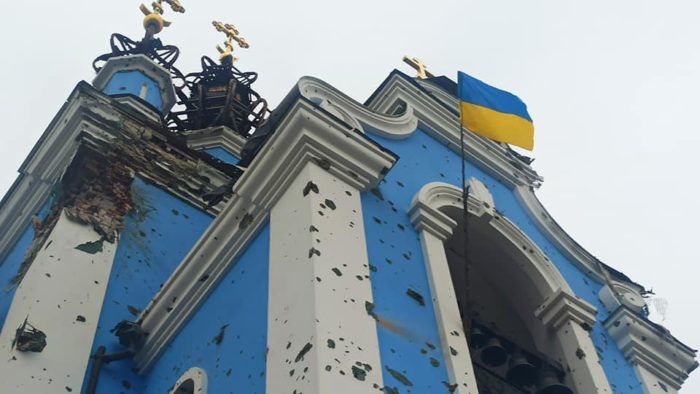The village was a battlefield between the Ukrainian and Russian forces, changing hands frequently. Villagers fled the area; only two pensioners – an elderly mother and her son – remained to tell the story. War journalist Oleksiy Kashporovskyi recounts the horrors of the Russian occupation.
The Ukrainian Army has advanced into Donetsk Oblast, liberating towns and villages along the way. Among them is the sleepy, little village of Bohorodychne, which used to be inhabited by about 800 people. In the village of Bohorodychne – which means “where God was born” – some of the onion domes of its farylike blue church have fallen.
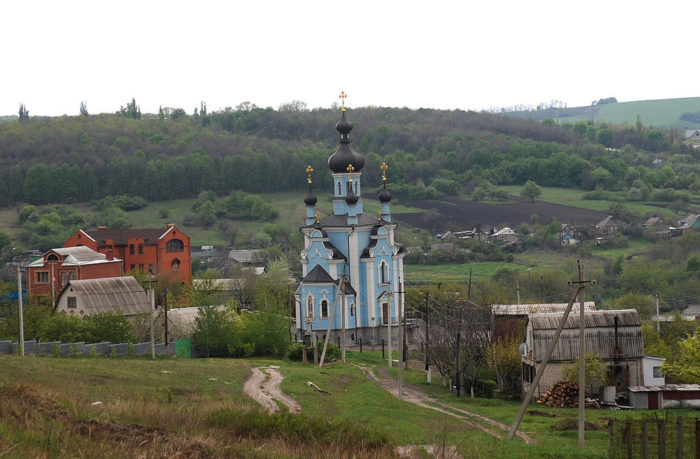
The village of Bohorodychne came under attack by Russian forces in June 2022, during the Russian invasion of Ukraine. On August 17 the Russian forces captured the village. In mid-September, Ukrainian troops entered the village, from which all the inhabitants, but two, had fled or had been killed. War journalist Oleksiy Kashporovsky recounts his first impressions.
The Ukrainian flag once again flutters above the village of Bohorodychne, Kramatorsk Raion, Donetsk Oblast. Last week, paratroopers of the 81st Separate Air Mobile Brigade hoisted the flag on the façade of the half-ruined church.
The Russians fled so quickly that they left several pots of uncooked pasta on the stove… and a lot of weapons and ammunition. And shit…. mountains of shit. They did their business everywhere – in the school where they lived, in private homes and even in the church of the local monastery. They even set up a laundry room just behind the church altar.
For months, fierce battles had been fought in and around the village. When a certain calm settled in the area, we found many bodies of our soldiers – some were headless and without shoes. We also discovered half a dozen bodies of murdered civilians.
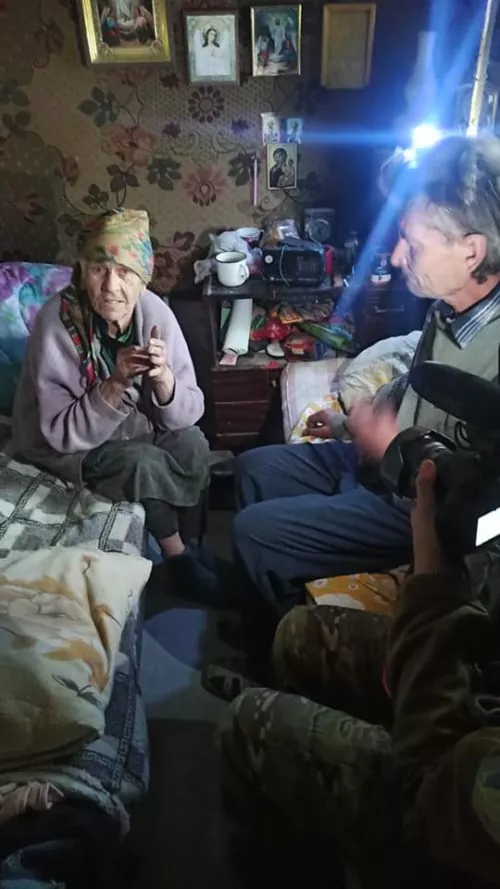
Only two villagers remained after the Russian occupation – 60-year-old Mykola Honchar and his mother, 93-year-old Nina. These two elderly pensioners survived the occupation.
Mykola and Nina live in a tiny underground shelter, about eight square metres at most. It used to be a household storage shack. Today, it’s almost the only intact building in Bohorodychne. All the homes, buildings, administrations are in ruins.

As soon as Nina sees our soldiers, she begins scrambling about her tiny abode, wondering what to give us and worrying about how to treat us.
“Oh, listen, dear boys, I’ll dig up some potatoes for you… right away! Kolya, how about a goose? Come on, I’ll pluck it for you now,” Nina speaks rapidly, turning back and forth between us and her son Mykola.
“Mom, there are only two geese left! The katsaps took them all!” Mykola shouts back.
“Well then, let’s slaughter one and keep the other! And we’ll all get together and say a prayer of remembrance for Vasia…” insists Nina.
I turn away because tears are welling up in my eyes. How can a grown man cry before an elderly woman who has seen and suffered so much, I think?
Vasia is Mykola’s brother, Nina’s eldest son. He was shot by the Russians. His wife was also summarily executed. Mykola rolled them up in a blanket and buried them on the hill behind the house.
“I’m the lazy one, a nobody, but Vasia was smart. He liked studying and had two higher degrees!” says Mykola.
Suddenly, he grabs my hand and leads me to a pile of grenades, arranged neatly behind the ruined house. I stand there, completely stunned. I realize that Mykola himself defused the tripwires in the grenades.
“Yep, and I also armed them before, when the katsaps were here… they were intended for those bastards. They killed my brother!” Mykola says angrily. “I’m a patriot, you understand? This is my land, my home; I live here! And those bastards came and shot my brother… If I didn’t have to take care of my elderly mother, I’d have attacked them with a grenade…”
A strong stench overcomes us as we approach the half-ruined monastery. We see the remains of a dead goat, which the Russians threw carelessly under a tree. It seems that they killed and ate most of the animals in the village. A bunch of RPGs and broken bricks lie scattered nearby. The dome of the bell tower lies sadly near a scorched tree. It fell after a Russian aerial bomb hit the monastery. The church was blown up in one of the many shellings the village has seen, as it was taken and re-taken several times by Russian and Ukrainian troops fighting in the Donbas.
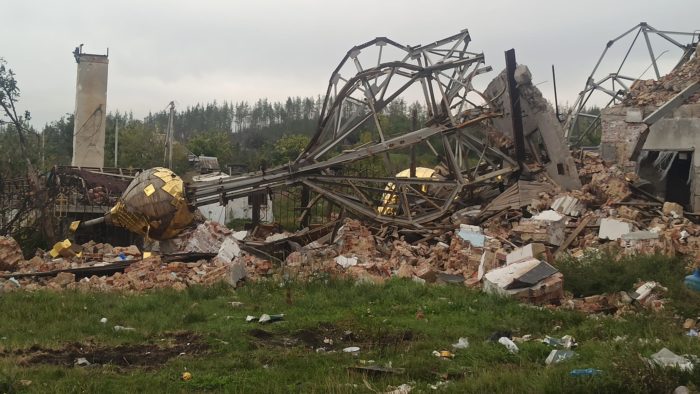
The Ukrainian flag is already hanging on the bullet-ridden façade of the church. At first, our guys wanted to hang it over the dome, but they weren’t able to climb to such a height… and it was dangerous. The Russians lived and stored their ammunition in the church. When they began running away, they set the building on fire. They probably hoped that everything would explode, but it didn’t happen. Our paratroopers were thrilled, as they got an unexpected gift – a huge arsenal of ammunition.
The Russians looted and stole; they even took the church icons. They installed a makeshift latrine behind the holy gates of the iconostasis, but this didn’t stop them from defecating everywhere.
The Russians also used the school premises as living quarters. Leftover food, pornographic images, abandoned weapons and ammunition are scattered in the main hall and classrooms. The school resembles a camp for the homeless. In a corner, the fighters of the “second most powerful army” set up a “love nook” – several mattresses on the floor, hand cream and Russian pornographic magazines. I shake my head in disbelief… I thought that such publications had gone out of style at least twenty years ago!
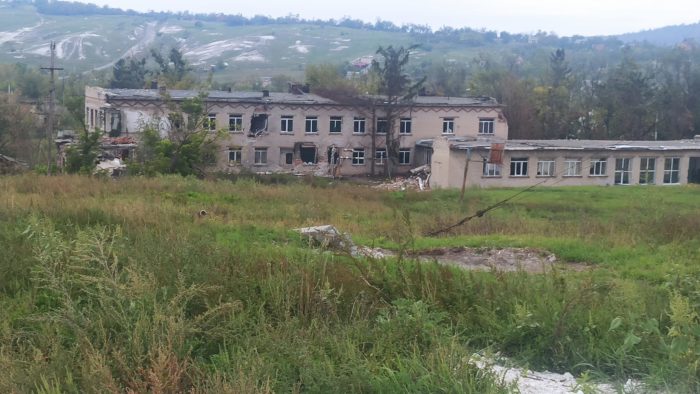
In the school yard, our guys are feeding the local cats with canned food found in some abandoned Russian rations. The scrawny felines – big and small – purr happily and rub their backs against our legs. They’re probably glad that real people have re-appeared in Bohorodychne.
On the way back, we meet up with Mykola again. He hurriedly and persistently forces a three-litre jar of honey into our hands. Mykola won’t take no for an answer. He waves, smiles and makes his way home to his elderly mother.
Tonight will probably be the first night of peace and quiet in Bohorodychne…
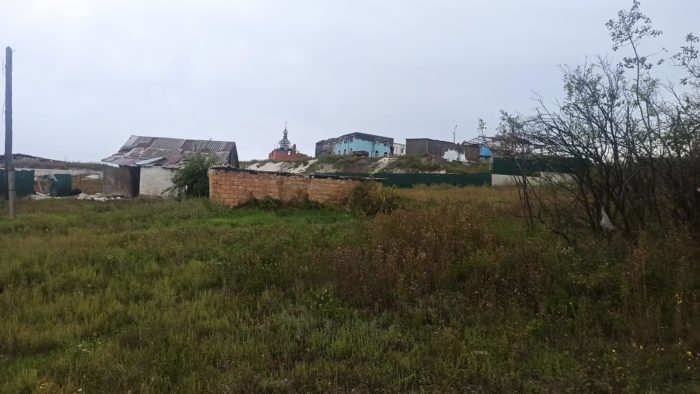
Related:
- “I had a bucket of liquid manure in case Russians wanted to rape me.” Stories from Ukraine’s deoccupied South
- Killed for refusing to shout “Glory to Russia!”: Russian war crimes in Trostianets
- He was a Putin fan. Then Russians bombed his house
- Russian war crimes in Katiuzhanka: torture chamber, toilets in classrooms, and stolen lingerie
- Cruelty, murder, and destruction in Bucha




